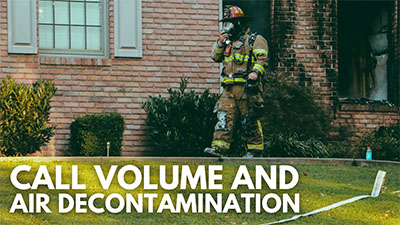Does Fire Call Mix and Volume Affect Your Need for Air Decon?
Many fire departments are discussing firefighter cancer risk, and you may have heard discussions at your own department about how to be healthier in the cab and at the station. You may be wondering how important an air decontamination and filtration system is.
Maybe you believe that on-scene PPE and SCBA protect you during an active fire incident and that is enough. Are most of your calls medical so it was suggested that an air decon system would be a waste of money? Maybe your small volunteer department doesn’t have high call volumes.
These are all valid points, so let’s explore them a bit more.
I wear PPE on Scene – I Don’t Need Air Decon!

Car fires, structure fires, or brush fires have you donning turnouts, SCBA, and helmets, so you aren’t breathing the smoke in any way. On-scene that may be true, but once you finish on the fire ground what do you do?
If you’re like many firefighters around the globe, you remove your SCBA, hop in the cab, and ride back to the station. During this drive, your gear continues to off-gas and emit volatile organic compounds or VOCs. These are then breathed in and can enter your lungs and bloodstream with the potential to cause long-term health issues.
Back at the station, the risk continues. Your gear off-gasses in the station meaning you can breathe in those contaminants for hours after the call. Until you shower and change clothing, you may also be carrying particulates and other threats with you on your skin and clothing.
These spaces are also occupied by multiple people, meaning aerosols from their breathing, coughing, and sneezing are spreading through the air.
In each of these situations, your health risk may be lessened by using a comprehensive system that reduces VOCs, particulates, and aerosols in the air you breathe.
Most of our Calls are Medical – We Aren’t Even in Full Gear!

We get it. For many departments, medical calls and ambulance assistance are the majority of the calls they take. If you’re one of them, an air decon system may seem useless.
However, think about your time on these calls. Patients are often sick, coughing, sneezing, or vomiting. Having an effective system in place to reduce aerosols and odors in ambulances and other responding apparatus can help minimize your risk of communicable disease.
It’s also possible that you could be exposed to fumes from paints, cleaning products, or other elements that are harmful if breathed in. A system that handles aerosols can effectively reduce these threats as they are released from your clothing, giving you healthier air to breathe.
We Don’t Go on Enough Calls Each Year!
Some departments do not see a lot of calls each year – and that’s fair. However, your crew is still exposed to the VOCs, particulates, and aerosols from the fire. These elements are transported on gear, in your vehicles, and at the station. Even limited exposure over time can lead to serious health problems.
Additionally, many stations across the United States, and likely across the world, are aging. In fact, in 2019 the NFPA released a report that showed that more than 21,000 fire stations across the United States were more than 40 years old. At the time, this was 43% of fire stations in the country. While there is no conclusive research about mold in fire stations, the susceptibility to water damage, humidity, and dampness likely makes fire stations common places for mold growth. Supplying an air filtration system capable of reducing mold spores in the air can positively affect your crew’s health.
Conclusion
If your call mix is mostly medical and you don’t go on many calls each year, do you need an air decontamination and air filtration system? We think so.
At the end of the day, your on-scene PPE can only do so much for your crew. Many of the protective measures taken for health must be opted into at an individual level, but with a good system that automatically runs, like our CrewProtect and StationProtect, your firefighters can receive some benefit with no extra effort on their part.
You can also help your crew by implementing on-scene gross decontamination procedures and ensuring a good understanding of your department’s health risks and opportunities.
